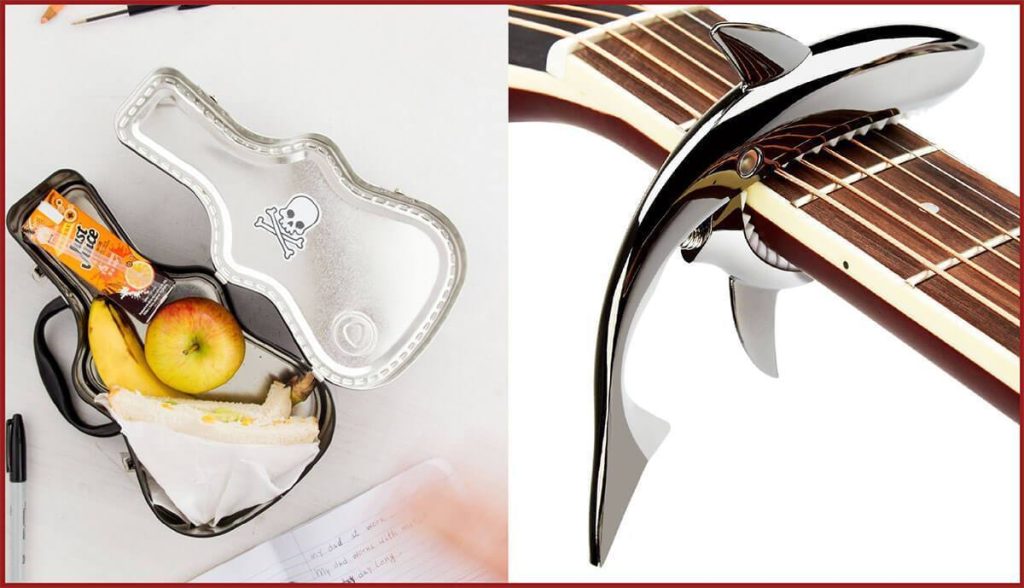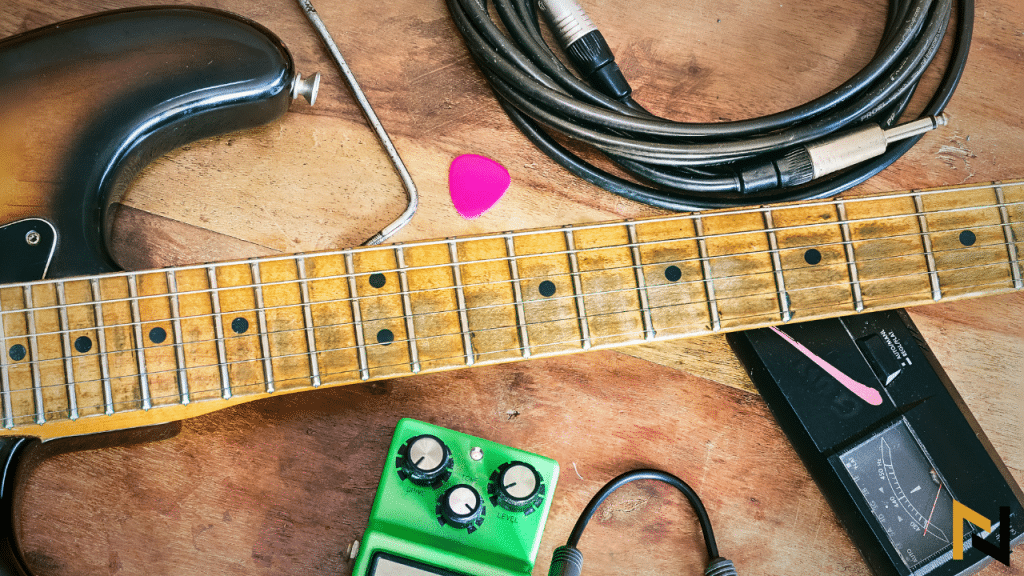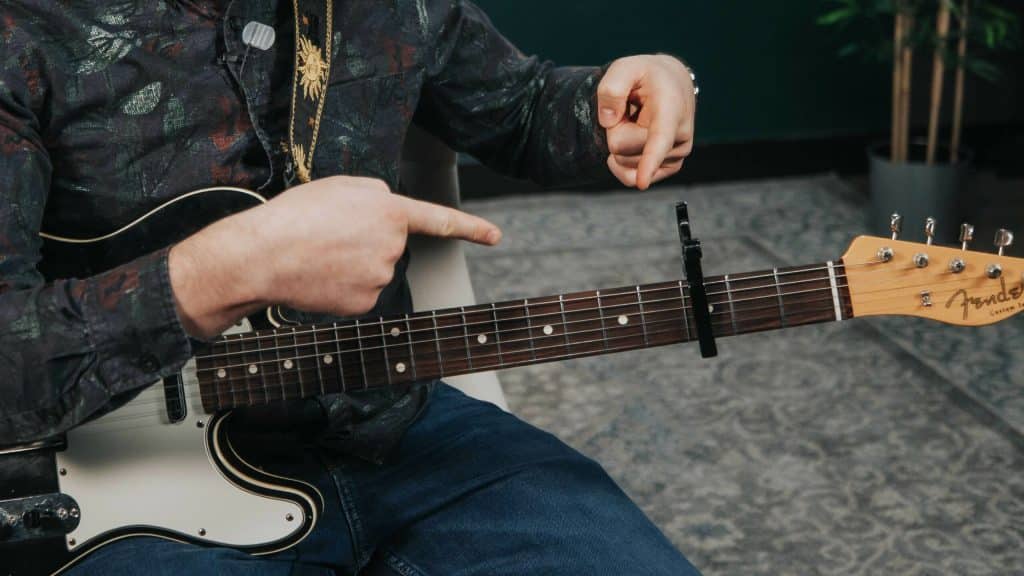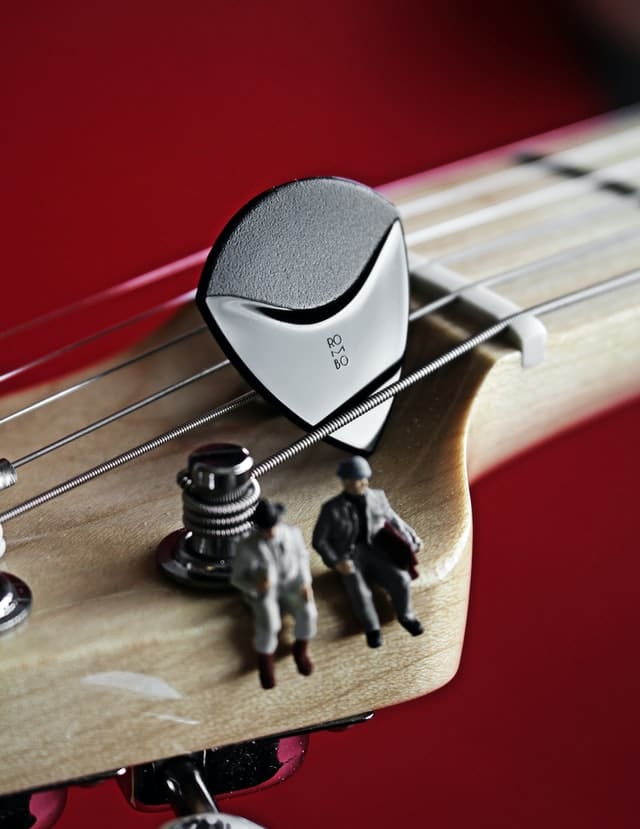Are you a passionate musician looking to enhance your guitar playing experience? Look no further! In this article, you will discover the top guitar accessories that every musician should have. From high-quality guitar picks to versatile guitar straps, we’ve got you covered. These accessories are not only essential for improving your performance, but they also contribute to your overall comfort and style. So, whether you’re a beginner or a seasoned pro, read on to find out which guitar accessories will take your playing to the next level.
1. Guitar Picks

Different types of picks
When it comes to playing the guitar, one of the most important accessories you need is a guitar pick. Guitar picks come in various shapes, sizes, and thicknesses, each producing a different sound. The most common shapes include standard, teardrop, and jazz picks. Standard picks are the most versatile and widely used, while teardrop picks offer a more rounded sound. Jazz picks, on the other hand, are smaller and thicker, ideal for players who prefer speed and precision.
Materials used for picks
Guitar picks can be made from various materials, each offering a unique tone and feel. The most popular materials include plastic, nylon, and celluloid. Plastic picks are affordable, readily available, and produce a bright sound. Nylon picks are known for their flexibility and durability, making them suitable for all playing styles. Celluloid picks are also widely used due to their vintage vibe and warm tone.
Choosing the right pick
Choosing the right pick depends on your personal preferences and playing style. If you’re a beginner, it’s recommended to start with a standard-shaped, medium thickness plastic pick. This will give you a good balance between control and flexibility. As you progress, you can experiment with different shapes and thicknesses to find the perfect pick that suits your playing style and the genre of music you enjoy.
Popular brands of picks
There are several well-known brands in the guitar pick industry that offer a wide range of choices. Some popular picks brands include Dunlop, Fender, and Ernie Ball. These brands have been trusted by guitarists worldwide for their high-quality picks that deliver consistent performance and durability.
2. Guitar Strings
Types of guitar strings
Guitar strings can greatly affect the tone, feel, and playability of your instrument. The most common types of guitar strings are steel-string acoustic, nylon classical, and electric guitar strings. Steel-string acoustic strings are made of steel and are widely used for playing folk, country, and rock genres. Nylon classical strings, as the name suggests, are made of nylon and are ideal for classical and fingerstyle guitar playing. Electric guitar strings are specifically designed for electric guitars and have a thinner gauge compared to acoustic strings.
Different materials for strings
Guitar strings can be made from different materials, with each material offering a distinct tone and feel. Common materials used for strings include steel, nickel, bronze, and phosphor bronze. Steel strings are bright and have a clear tone, while nickel strings produce a warmer sound. Bronze strings are commonly used for acoustic guitars as they offer a balanced and resonant tone. Phosphor bronze strings are similar to bronze strings but have a longer lifespan due to the added phosphor coating.

Choosing the right strings for different styles
Choosing the right strings depends on the style of music you play and personal preference. If you play acoustic guitar and want a bright and lively sound, steel strings would be a good choice. For a warmer and more mellow tone, bronze or phosphor bronze strings would be ideal. Nylon strings are perfect for classical and fingerstyle guitar players seeking a softer, mellower tone. Electric guitar players can choose between various nickel or steel alloy strings, depending on the desired tone and playability.
Popular string brands
When it comes to guitar strings, there are several trusted brands that have been providing high-quality strings for decades. Some popular string brands include D’Addario, Ernie Ball, and Elixir. These brands offer a wide range of string options suitable for different playing styles and guitar types. Whether you’re a beginner or a professional guitarist, investing in good quality strings from reputable brands can significantly enhance your playing experience.
3. Guitar Straps
Different types of guitar straps
A guitar strap is an essential accessory for guitarists, providing support and stability while playing standing up. There are different types of guitar straps available, including standard fabric straps, leather straps, and padded straps. Standard fabric straps are the most common type and come in a wide variety of colors and designs. Leather straps offer durability and a classic look, while padded straps provide extra comfort for extended playing sessions.
Materials used for straps
Guitar straps are typically made from different materials, each offering its own benefits. Fabric straps are commonly made from nylon or polyester and are lightweight, affordable, and easy to adjust. Leather straps are known for their durability and can develop a unique patina over time, adding character to your guitar. Padded straps feature added cushioning for improved comfort during long performances.
Comfort and adjustability
When choosing a guitar strap, comfort and adjustability are key factors to consider. It’s important to find a strap that suits your body type and playing style. Adjustable straps allow you to find the perfect length for your preferred playing height. Padded straps can help reduce shoulder and back fatigue, especially during extended gigs or practice sessions.
Popular strap brands
Several reputable brands specialize in the production of high-quality guitar straps. Some popular strap brands include Levy’s, Planet Waves, and DiMarzio. These brands offer a wide range of straps, catering to different preferences and budgets. It’s worth investing in a reliable and comfortable strap, as it can greatly enhance your playing experience and prevent strain or discomfort while performing.
4. Guitar Tuners

Types of guitar tuners
Keeping your guitar properly tuned is crucial for achieving the best sound and playability. There are different types of guitar tuners available, including clip-on tuners, pedal tuners, and handheld tuners. Clip-on tuners attach to the headstock of your guitar and use vibrations to detect the pitch. Pedal tuners are larger and can be connected to your pedalboard for convenient tuning during live performances. Handheld tuners are compact and portable, making them great for practicing on the go.
Digital vs analog tuners
Guitar tuners can be either digital or analog. Digital tuners use advanced technology to accurately display the pitch of each string, usually through an LED or LCD screen. Analog tuners, on the other hand, rely on a needle or dial to indicate the pitch. Digital tuners are generally more precise and user-friendly, displaying the exact note and even providing visual feedback to assist with tuning accuracy.
Accuracy and ease of use
When choosing a guitar tuner, accuracy is paramount. A tuner that consistently provides accurate readings ensures that your instrument is in tune and helps you train your ear to recognize proper pitch. Additionally, ease of use is essential, especially for beginners. Look for a tuner with a clear display, intuitive controls, and fast response time, making the tuning process quick and hassle-free.
Popular tuner brands
Various brands offer high-quality guitar tuners that are widely trusted by professionals and amateurs alike. Some popular tuner brands include Boss, Korg, and TC Electronic. These brands have established themselves as leaders in the tuner market, delivering reliable and accurate tuners that are essential for any guitarist’s toolkit.
5. Guitar Capos
Different types of capos
A guitar capo is a device that clamps across the guitar’s neck, shortening the playable length of the strings. This allows players to easily change the key without having to learn new chord shapes. There are different types of capos available, including spring-loaded capos, strap-style capos, and partial capos. Spring-loaded capos are the most common and easy to use, while strap-style capos offer more versatility in positioning. Partial capos cover only specific strings, allowing for creative and unique chord shapes.
Materials used for capos
Guitar capos are typically made from various materials, with the most popular choices being metal and rubber. Metal capos offer durability and longevity, ensuring a secure grip on the neck. Rubber capos provide a softer touch and can help reduce the risk of damaging the guitar’s finish. Some capos also feature additional features such as rubber padding to prevent buzzing or adjustable tension for fine-tuning.

Adjustability and ease of use
When choosing a guitar capo, consider its adjustability and ease of use. Look for a capo that can be easily adjusted to fit different neck shapes and widths, allowing for a secure and comfortable grip. An easy-to-use capo should be quick to attach and remove, without causing any damage to your instrument. Experimenting with different capo positions can unlock new chord voicings or help you play difficult chord progressions more comfortably.
Popular capo brands
Several reputable brands specialize in producing high-quality guitar capos. Some popular capo brands include Kyser, Shubb, and G7th. These brands offer a range of capos suitable for different guitar types and playing styles. Investing in a reliable capo allows you to experiment with different keys and expand your musical possibilities.
6. Guitar Effects Pedals
Types of guitar effects pedals
Guitar effects pedals are used to alter the sound of your guitar, adding various effects and textures to your playing. There is a wide variety of guitar effects pedals available, each serving a distinct purpose. Common types of effects pedals include distortion, delay, modulation, and reverb pedals. Distortion pedals add crunch and gain to your guitar tone, ideal for rock and metal genres. Delay pedals create echoes and repetitions, adding depth and ambiance to your sound. Modulation pedals include chorus, flanger, and phaser effects, which can add movement and texture to your playing. Reverb pedals simulate the acoustics of different spaces, from small rooms to large concert halls, creating a sense of space and depth.
Common effects and their applications
Guitar effects pedals offer a wide range of sonic possibilities, with each effect serving different musical applications. Distortion pedals are commonly used in rock and metal to achieve heavier guitar tones. Delay pedals are versatile and can be used to create atmospheric sounds or rhythmic patterns. Modulation pedals add dimension and character to your sound and are often used in genres like funk and psychedelia. Reverb pedals enhance the natural ambience of your playing, making it suitable for genres like blues and ambient music.
Analog vs digital pedals
Guitar effects pedals can be classified as either analog or digital. Analog pedals use analog circuitry to modify the guitar signal, providing a warm and organic sound. Digital pedals, on the other hand, use digital signal processing to recreate and manipulate the guitar tone digitally. Analog pedals are often favored by players seeking a vintage, authentic sound, while digital pedals offer more versatility and advanced features.
Popular pedal brands
There are numerous trusted brands in the guitar effects pedal industry that offer high-quality pedals suitable for a wide range of playing styles. Some popular pedal brands include Boss, Electro-Harmonix, and Strymon. These brands have gained a reputation for their innovation and reliability, delivering pedals that meet the demands of professional guitarists around the world.
7. Guitar Stands and Hangers

Types of stands and hangers
When it comes to storing and displaying your guitar, having a reliable stand or hanger is essential. There are different types of stands and hangers available, including A-frame stands, wall-mounted hangers, and tripod stands. A-frame stands are versatile and portable, providing stability and easy access to your guitar. Wall-mounted hangers are space-saving options that securely hold your guitar on the wall. Tripod stands offer stability and are suitable for both acoustic and electric guitars.
Space-saving options for different settings
Whether you have a small bedroom studio or a crowded stage, having a space-saving guitar stand or hanger can be a game-changer. Wall-mounted hangers allow you to showcase your guitar while saving valuable floor space. A-frame stands offer a compact and portable solution, ideal for gigs, rehearsals, or practicing at home. Tripod stands can be folded and transported easily, making them convenient for musicians constantly on the move.
Durability and stability
When choosing a guitar stand or hanger, durability and stability are crucial factors to consider. A well-built stand or hanger should securely hold your guitar without the risk of it falling or getting damaged. Look for stands or hangers made from sturdy materials such as metal or hardwood, as they offer better support and longevity. Additionally, stands or hangers with padded surfaces can help protect your guitar’s finish and prevent any scratches or dings.
Popular stand and hanger brands
Several reputable brands specialize in producing reliable guitar stands and hangers. Some popular brands include Hercules, On-Stage, and String Swing. These brands offer a variety of stands and hangers designed to ensure the safety and proper display of your valuable instrument. Investing in a quality guitar stand or hanger not only protects your guitar but also allows for easy access and storage, making your playing experience more convenient and enjoyable.
8. Guitar Cases and Gig Bags
Types of cases and gig bags
Properly protecting your guitar during transportation is essential to ensure its longevity and safeguard against potential damage. There are different types of cases and gig bags available, including hardshell cases, softshell cases, and padded gig bags. Hardshell cases offer maximum protection and are perfect for long-distance travel or touring. Softshell cases provide a balance between protection and portability, making them great for local gigs and rehearsals. Padded gig bags are lightweight and convenient for short trips or storing your guitar at home.
Protection and portability features
When choosing a guitar case or gig bag, consider the level of protection it offers as well as its portability features. A well-padded interior, secure latches, and durable exterior materials are key to ensuring your guitar is well-protected. Additionally, features such as backpack-style straps, accessory pockets, and reinforced handles can enhance the convenience and portability of your chosen case or gig bag.
Suitable options for different guitar types
It’s important to choose a case or gig bag that is suitable for your specific guitar type. Acoustic guitars usually require larger cases or bags, while electric guitars can fit into more compact options. Additionally, there are specialized cases and gig bags available for bass guitars, classical guitars, and other unique guitar shapes. It’s crucial to find a case or gig bag that snugly fits your guitar to prevent any movement or potential damage during transportation.
Popular case and gig bag brands
Trusted brands in the guitar case and gig bag industry offer a wide range of options to suit different needs and preferences. Some popular brands include SKB, Gator, and Mono. These brands are known for their durable and reliable cases and gig bags that provide exceptional protection for your guitar. Investing in a high-quality case or gig bag ensures the safety and longevity of your instrument, allowing you to transport it with peace of mind.
9. Guitar Slides
Different types of slides
Guitar slides are cylindrical or tube-like objects that are worn on the fingers to produce unique and haunting sounds on the guitar. There are different types of slides available, including metal slides, glass slides, and ceramic slides. Metal slides, usually made of brass or steel, provide a bright and crisp tone. Glass slides offer a smooth and warm sound, while ceramic slides produce a bright and articulate tone.
Materials used for slides
Slides can be made from various materials, each offering a distinct tone and feel. Metal slides are popular due to their durability and bright tone. Glass slides provide a smooth and organic feel, allowing for seamless transitions between notes. Ceramic slides offer a bright and precise sound, making them great for playing melodies and solos.
Techniques and applications
Using a slide requires a different approach to playing the guitar, offering unique techniques and applications. From the bluesy sounds of slide guitar to the melodic runs in country music, slides allow for expressive playing and creative improvisation. Slides can be used to mimic the sound of a human voice, adding emotion and character to your playing. Whether you’re sliding across a single string or using the slide on multiple strings, mastering slide guitar techniques can open up a whole new world of playing possibilities.
Popular slide brands
Several reputable brands specialize in producing high-quality guitar slides. Some popular slide brands include Dunlop, Rocky Mountain Slides, and Diamond Bottlenecks. These brands offer a variety of slides made from different materials and in various sizes, allowing you to find the one that suits your playing style and sonic preferences. Investing in a quality slide can greatly enhance your slide guitar playing and deliver those soulful, resonant tones.
10. Guitar Standalone Amplifiers
Types of amplifiers
A standalone amplifier is an essential accessory for electric guitar players, allowing you to amplify your sound and shape your tone. There are different types of standalone amplifiers available, including tube amplifiers, solid-state amplifiers, and modeling amplifiers. Tube amplifiers are known for their warm and rich tone, often preferred by guitarists seeking a vintage sound. Solid-state amplifiers offer durability and reliability, producing a clean and precise tone. Modeling amplifiers use digital technology to emulate the sound of various classic amplifiers, offering a wide range of tones and effects.
Wattage and sound customization options
When choosing a standalone amplifier, wattage and sound customization options are important considerations. The wattage of an amplifier determines its volume and power. Lower wattage amplifiers are suitable for practice sessions and small gigs, whereas higher wattage amplifiers can provide enough volume for larger venues. Additionally, having control over the equalization (EQ), gain, and tone shaping options allows you to tailor your sound to your liking and match the requirements of different musical genres.
Portability and versatility
Depending on your needs, the portability and versatility of a standalone amplifier can greatly impact your playing experience. If you plan to gig or perform regularly, a lightweight and portable amplifier would be more convenient. Models that offer additional features like built-in effects, headphone outputs, and direct recording capabilities add to the versatility of your amplifier, allowing you to adapt to different playing situations.
Popular standalone amplifier brands
Several reputable brands specialize in producing high-quality standalone amplifiers. Some popular brands include Fender, Marshall, and Vox. These brands have a long-standing reputation for delivering reliable amplifiers that cater to the needs and preferences of guitarists across various genres. Investing in a reputable standalone amplifier ensures that you can achieve the desired sound and reach the full potential of your electric guitar.
In conclusion, having the right guitar accessories can greatly enhance your playing experience and open up new possibilities in terms of tone, technique, and convenience. From guitar picks that provide the perfect grip and attack to high-quality strings that deliver optimal sound and playability, each accessory plays a crucial role in shaping your guitar journey. Whether you’re a beginner or an experienced guitarist, choosing accessories from popular and trusted brands ensures that you have the best gear to support your musical endeavors. So, explore the wide range of guitar accessories available, experiment with different options, and find the ones that suit your playing style, preferences, and goals. Happy playing!






